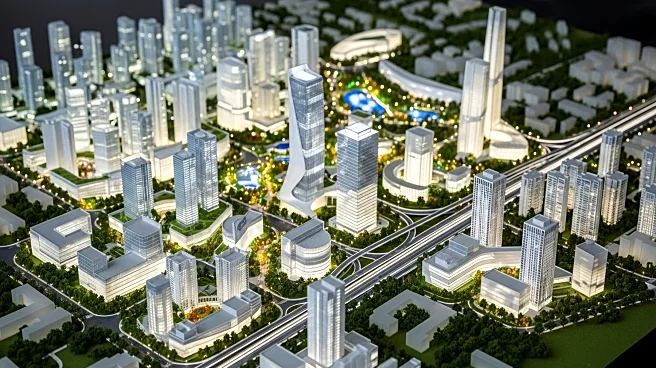What is the story about?
What's Happening?
Tsinghua University, in collaboration with MIT and other institutions, has developed a new urban planning framework that leverages large language models (LLMs) to enhance the planning process. This innovative approach integrates AI capabilities with human expertise to address the complexities of modern urban planning. The framework, detailed in a paper published in Nature Computational Science, involves AI acting as a 'smart planning assistant' throughout the planning stages, from conceptualization to evaluation. The AI system has demonstrated the ability to outperform over 90% of human planners in certain tasks, suggesting a significant advancement in the field. The research team includes scholars from Tsinghua University, MIT, and Northeastern University, who have collectively worked on this interdisciplinary project to create a more efficient and responsive urban design process.
Why It's Important?
The introduction of AI-driven urban planning represents a potential paradigm shift in how cities are designed and managed. By integrating AI with human planners, the framework aims to overcome traditional bottlenecks in urban planning, such as limited public participation and qualitative evaluations. This development could lead to more livable and equitable urban environments, as AI can process vast amounts of data and provide innovative solutions that might be overlooked by human planners. The framework's ability to simulate urban dynamics and predict the impact of planning decisions could significantly enhance the decision-making process, benefiting urban residents and stakeholders by creating more sustainable and efficient cities.
What's Next?
The research team emphasizes that the AI framework is not intended to replace human planners but to complement their work by handling data processing and simulation tasks. Future research will focus on addressing challenges such as data scarcity, computing resource demands, and potential biases in AI models. The team plans to develop open data platforms and fairness algorithms to ensure the technology serves diverse urban environments equitably. As the framework evolves, it is expected to empower urban planners to design cities that better meet the needs of their inhabitants, leveraging AI to unlock new levels of creativity and efficiency in urban design.
Beyond the Headlines
The ethical and social implications of AI-driven urban planning are significant. The framework's success depends on addressing potential biases and ensuring that AI-generated solutions are inclusive and equitable. The collaboration between AI and human planners could redefine professional roles, emphasizing the importance of ethical considerations and stakeholder communication in urban planning. As AI becomes more integrated into this field, it will be crucial to balance technological advancements with human values and societal needs.
















